
Anno 501 - 600

|
Popes on Parade Anno 501 - 600 |
POPshop |
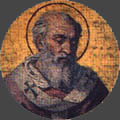 |
Saint SymmachusAnno 498-514 |
A Sardinian. The last convert from Paganism to become Pope, Symmachus was a deacon before his election. As part of the legacy of Anastasius, each of the two factions of the Roman schism elected their own Pope. Symmachus, the candidate of the hardliners, was elected first. Later that day, backed by funds from a rich Senator named Festus (I am not making this up), the Roman archpresbyter Laurentius was elected by the pro-reconciliation faction. Thes usual rioting started almost immediately, and King Theodoric was called in to settle the issue. He chose for Symmachus on the theory that he'd been elected first. Laurentius agreed to abide by the decision, and the undisputed Pope Symmachus invested him as bishop of Nocera in Campania. This brings us to the year 499... |
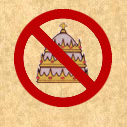 |
Laurentius(Antipope) |
By all accounts, Laurentius was enjoying his tenure as bishop of Nocera, but the pro-Byzantine party in Rome, led by Senators Festus and Probinus, hadn't given up. In 501, they jumped on Pope Symmachus for an error regarding the date of Easter. They appealed to Theodoric, and Symmachus was called before a Roman Synod to explain himself. Meanwhile, the pro-Byzantine faction, riled up by wild accusations of Papal whoring and gambling, had stormed the Lateran and re-installed Laurentius as Pope. Symmachus, on his way to the synod, was attacked and several of his deacons were killed. Despite the fact that the Pope refused to leave his Vatican home after this, the synod found him innocent of all charges. Theodoric, initally disposed to allowing the both of them to be Popes if they wanted, finally sided with Symmachus. Laurentius was "retired" to the country estates of Senator Festus. |
 |
Saint HormisdasAnno 514-523 |
An Italian from Frosinone in Latium. Hormisdas was from a wealthy and honourable family. Before becoming a priest he had been married; his son later became Pope Silverius. Described as "able and sagacious" (and a real smooth talker), he healed both the Laurentian schism in Rome, and the schism with Constantinople that had been festering since the pontificate of Felix II. With the death of the Vandal King Thrasamund in 523, the persecution of Catholics in northern Africa at last ended. Score three for three for Pope Hormisdas! |
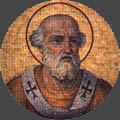 |
Saint John IAnno 523-526 |
A Tuscan. John was quite elderly when elected. A former Laurentian deacon, John was on excellent terms with the Byzantine Emperor Justin. When Justin began to appropriate Arian churches in the east and turn them over to Orthodox congregations, nobody was happier than John. Unfortunately, the Arian King of Italy, Theodoric, was most unpleased. The King ordered the Pope to go to Constantinople and reach an "understanding" with the Emperor. John was only too happy to comply, though the failure of the mission was a foregone conclusion to everyone except Theodoric. John received a hero's welcome from the Emperor and the eastern Church, complete with parades and parties. If the Byzantines were enraptured with John, the Ostrogoths weren't. Theodoric arrested the John immediately upon his return to Italy. The Pope died in a Ravenna prison awaiting the King's pleasure. |
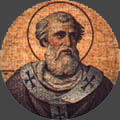 |
Saint Felix IV (III)Anno 526-530 |
When King Theodoric proposed cardinal-priest Felix of Samnium, son of Castorius for Pope, the clergy and people were sufficiently in fear that they elected him. Felix made the most of the King's favour to press for the interests of the Church. When Theodoric died later that year, the Gothic crown of Italy passed to his young grandson Athalaric. Italy was actually ruled by Athalaric's mother Amalasuntha, the daughter of Theodoric. She also was friendly towards Felix and the Catholics. During his final illness, Felix appointed Archdeacon Boniface as his successor. |
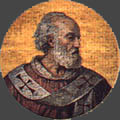 |
Boniface IIAnno 530-532 |
A German born in Rome, the son of Sigisbald. He was appointed by Pope Felix, but the vast majority of the Roman clergy refused to recognise him. Instead, they elected Dioscurus, who obliged Boniface by more or less immediately dropping dead. Famine reduced Rome's population, already shrinking after a century of barbarian invasions. Boniface was well-loved for his charity to the starving poor. The African Church was reorganised, and the Pope elevated the status of Carthage's bishop to Patriarch. Boniface appointed the deacon Vigilius as his successor, but it almost provoked a revolt. Nobody liked it, not the clergy, the people, King Athalaric, or the Byzantine Emperor. Faced with universal unpopularity, Boniface tore up the appointment. "Vigilius? Vigilius who?" |
 |
Dioscurus(Antipope) |
Elected by the Roman clergy, Dioscurus mysteriously keeled over dead just 22 days after his investiture. |
 |
John IIMercurius |
A Roman; the son of Projectus. Presbyter Mercurius, following his election as Pope, changed his name. He is the first Pope to do so since Peter. After Boniface's death, Rome erupted into intrigue, bribery, and rioting as the various aristocratic factions of the city put forward their candidates for the Papacy. The corruption and violence embarassed even the Goths, and that's saying something. King Athalaric eventually had to step in. Somehow, the pious and elderly Mercurius emerged as a consensus candidate. As Pope, he did nothing of note. |
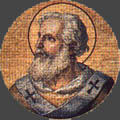 |
Saint Agapetus IAnno 535-537 |
A Roman aristocrat. Son of Gordianus, a priest. The Byzantine Emperor Justinian was determined to reconquer Italy for the Empire. Theodehad, the new King of Gothic Italy, was determined to stop him. In the middle of this mess is the new Pope, pro-Byzantine but determined to keep control of the Church out of Imperial hands. What to do? Agapetus pawned some of the Church's sacred vessels to pay for himself and five Italian bishops to go to Constantinople to plead with Justinian. Although the Pope and his retinue were treated like conquering heroes, the Emperor could not be convinced to call off the invasion. While in Constantinople, Agapetus deposed the Monophysite heretic Patriarch Anthimus (a favourite of the Empress Theodora), much to the delight of the Orthodox clergy. Agapetus, an old man when he was elected, died in Constantinople. |
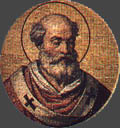 |
Saint SilveriusAnno 536-537 |
An Italian from Frosinone; the son of Pope Hormisdas. When Pope Agapetus died in Constantinople, the Empress Theodora promised his aide, Vigilius, that she would "arrange" for him to become Pope if he would promise to reinstate Anthimus, a Monophysite heretic, to the Patriarchy of Constantinople. Vigilius, lusting after the Papacy since his nomination by Pope Boniface II had been rejected in 532, agreed with alacrity. Meanwhile, Silverius had been elected Pope and the Byzantine General Belisarius had conquered half of Italy, including Rome. When Vigilius arrived with his note from the Empress, Belisarius tried to persuade Silverius to resign. He wouldn't. He then tried to persuade him to reinstate Anthimus. He wouldn't do that either. It was with some relief that Belisarius learned of the death of Princess Amalasuntha, long the power behind the throne of Gothic Italy, and the succession of the belligerent Vitiges as King. When Vitiges and the Goths besieged Rome, Belisarius used the occasion to accuse the Pope of consorting with the enemy. The Pope was deposed and sent into exile, and Vigilius at long last got his wish. Silverius died in exile shortly thereafter. |
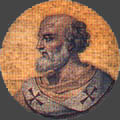 |
VigiliusAnno 537-555 |
A Roman of an aristocratic family. His father was the consul Johannes and his brother Reparatus was a senator. If one were to make a list of the top ten greatest Popes, the name of Vigilius would not appear. In fact, if one were to make a list of the top 200 greatest Popes, the odds are pretty good he wouldn't be on that one either. Vigilius had been trying to be Pope since the pontificate of Boniface II. He tried appointment and election; neither worked. He finally settled for bribery and brute force. He was installed as Pope by the Byzantine army. Despite the fact that the Empress paid him 700 pounds of gold, Vigilius somehow never managed to retrieve the church goods that had been pawned to pay for Silverius' trip to Constantinople. As Pope, Vigilius became an expert at playing the Orthodox Emperor Justinian and his Monophysite Empress Theodora (a former After a leisurely voyage, Vigilius spent seven years in Constantinople discussing theology with Justinian (primarily about a loony bit of Imperial meddling called The Three Chapters) and drinking wine from the Imperial cellars. While he was gone, the Goths under Totila took the city and held it for almost six years. Vigilius died on the way back to Rome. |
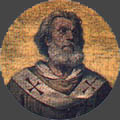 |
Pelagius IAnno 556-561 |
A Roman aristocrat, son of a Byzantine civil official. Pelagius spent some time in Constantinople, where he became a favourite of the Emperor Justinian. When Vigilius died, Justinian sent Pelagius to Rome to be Pope. He was never elected and was only installed after two bishops had been bribed to consecrate him. The western and eastern bishops came to schism over The Three Chapters. Taking the Imperial position, Pelagius was able to convince some of the western bishops to put the matter behind them. Pelagius worked desperately to impose some sort of order on Rome and Italy, now constantly under the boots of alternating barbarian and Byzantine armies. |
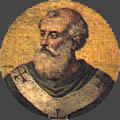 |
John IIIJohannes Catelinus |
A Roman aristocrat; son of the illustris Anastasius Catelinus. John was the first Pope actually elected since the doomed Silverius in 536. Disaster followed disaster during his pontificate. First, a horrible plague wiped out a considerable percentage of the population of the city. Then Narses, the brilliant Byzantine Military Governor of Italy, was fired by the Emperor, clearly sending the signal that Italy was ripe for plunder. Finally, the Lombards invaded. John spent the greater part of his pontificate cowering in the Roman catacombs. |
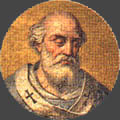 |
Benedict IAnno 575-579 |
A Roman; the son of Boniface. The Lombards won victory after victory in Italy, finally laying siege to Rome in 579. The Byzantine defenders proved incompetent, and grain sent from Egypt to relieve the siege only prolonged the suffering. Just to add to the general sense of hopelessness, a new plague broke out. It laid waste to the city and killed the Pope. Good times. |
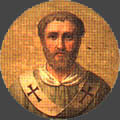 |
Pelagius IIAnno 579-590 |
A Goth born in Rome; son of Winigild. The plague (and a hefty bribe) succeeded in driving off the Lombards. Pelagius sent an embassy led by the deacon Gregory to Constantinople to "haunt the imperial palace day and night... to strain every nerve to induce the emperor to send help." Little was accomplished; the Emperor Maurice sent a few reinforcements, but not enough to do any good. Relations with the barbarians improved somewhat. The Franks invaded Italy to deal with the Lombards. They were doing fairly well, too, until the Lombards bribed them into going home. So much for religious zeal. Pealgius did manage to convince the Visigoths in Spain to convert to Catholicism. Pelagius died in a plague of "such fearful carnage that no one remembered that its like had ever been seen in the world." It's a wonder there was anybody left alive in Rome. |
 |
Saint Gregory I |
Born c. 540. A Roman of a wealthy, aristocratic family. His father was Gordianus Amicia, who owned huge tracts of land in Sicily, and his mother was St. Silvia. Gregory was Prefect of Rome in 573, but retired to a monastery after the death of his father. He gave up everything; even the Sicilian estates were sold to found six monasteries. Gregory quickly became abbot, then a deacon in the Roman Church, then Papal nuncio to the court of the Byzantine Emperor. With the death of Pelagius, the Romans unanimously chose Gregory for Pope. He refused. The Emperor insisted. Gregory threatened to run away. And then came the first miracle: Gregory agreed to "temporarily" administer Rome while waiting for his final plea to the Emperor to be answered. He organized a massive public procession of repentance. As they passed the mausoleum of the Emperor Hadrian (one of the few landmarks not destroyed by the various invaders), the penitents saw a vision of the Archangel St. Michael on top of the mausoleum in the act of sheathing his sword. The miracle was interpreted as a sign that the plague was over, and indeed it was. Word came back from the Emperor that he would accept no other as Pope but Gregory. Faced with the combined messages of God and Emperor, Gregory finally agreed to be Pope. With Gregory's accession, we at last have a tiny glimmer of light in the Dark Ages. During his pontificate, Gregory:
Even with all of these great accomplishments (and many, many more unlisted), Gregory was far more popular outside of Rome than within the city. Once again, a terrible famine struck Italy in 604, and the people blamed him for it. Regarded throughout the Christian world as a saint, a philosopher, and a doctor of the Church, he was forgotten in Rome after his death. His epitath reads consul Dei (God's consul), but the title he allowed himself was Servus servorum Dei, servant of the servants of God. |
Complete List of Popes
First Century |
Second Century |
Third Century |
Fourth Century |
Fifth Century
Sixth Century |
Seventh Century |
Eighth Century |
Ninth Century |
Tenth Century
Eleventh Century |
Twelfth Century |
Thirteenth Century |
Fourteenth Century |
Fifteenth Century
Sixteenth Century |
Seventeenth Century |
Eighteenth Century |
Ninteenth Century |
Twentieth Century
Twenty-First Century
Ecumenical Councils | Papal Box Scores